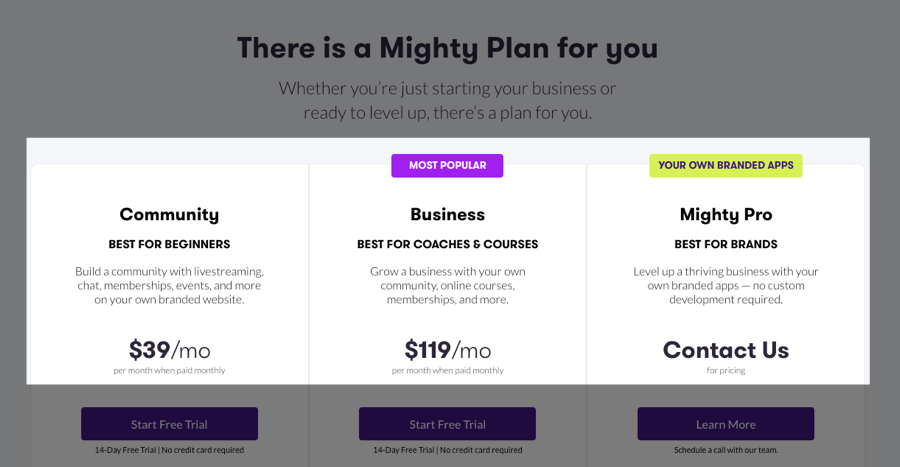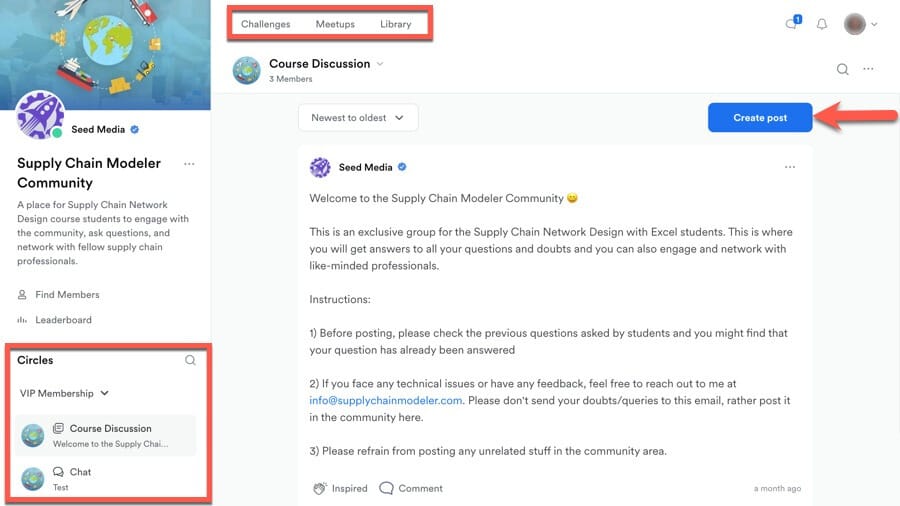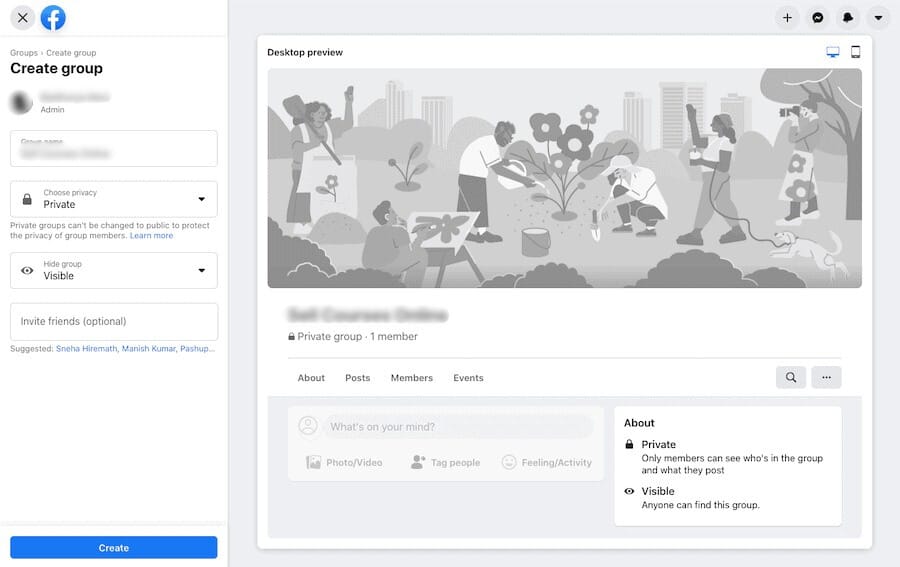home / Best Course Platforms /Kajabi Review
We earn a commission from partner links on this site. This doesn’t affect our opinions or evaluations.
Digital communities are experiencing unprecedented growth, and their popularity is poised to surge as individuals seek connection amid increasing digital isolation.
For online creators and SaaS product proprietors, establishing a community represents a strategic approach to expand audience reach, enhance customer loyalty, collect valuable user insights, deliver exceptional customer support, and more.
Navigating the crowded landscape of online community platforms can feel overwhelming, with numerous options competing for your attention.
This comprehensive guide will spotlight the most exceptional online community platforms, dissecting their distinctive features, highlighting their strengths, and candidly discussing potential limitations.
Our recommendations stem from rigorous, hands-on testing, ensuring you receive expert, actionable insights. Let’s dive in!
Selecting the right platform requires a nuanced understanding of community builder functionality and a thorough assessment of your specific requirements.
Modern community platforms fundamentally differ from traditional forum solutions.
Traditional forum builders primarily offer discussion boards, whereas contemporary community platforms deliver a comprehensive suite of member engagement features.
Some features are non-negotiable—crafting compelling content, orchestrating events, implementing community management tools, developing member directories, generating personalized activity streams, enabling direct communication, and more.
Additionally, several critical engagement tools should be part of your platform’s capabilities:

Beyond these fundamental features, your specific requirements will vary depending on the nature of your online community and ultimate objectives.
For instance, if your vision involves creating a membership site or monetizing community access, you’ll require robust monetization infrastructure including comprehensive payment processing, streamlined checkout mechanisms, and flexible pricing options.
Likewise, for creators managing an existing membership website, seamless single sign-on (SSO) integration between platforms becomes a critical consideration to ensure smooth user experience and simplified access.
Ultimately, careful financial planning is paramount—thoroughly evaluate the platform’s pricing structure and ensure it aligns with your budgetary constraints.
With these considerations in mind, let’s explore the most exceptional community-building platforms available in 2025.

Circle (Circle.so) emerges as a comprehensive, cloud-based community platform that holistically addresses every critical aspect of digital community development—from intuitive design and member engagement to sophisticated monetization and nuanced management strategies.
The platform’s groundbreaking Spaces feature offers unprecedented flexibility, empowering creators to meticulously organize their community infrastructure while maintaining granular control over member access and permissions.
Circle distinguishes itself through a robust suite of engagement tools that cater to the most demanding community builders, including multimedia-rich content publishing, dynamic event hosting and livestreaming capabilities, integrated online learning modules, seamless direct communication channels, and intelligent, personalized notification systems.

Circle offers exceptional monetization flexibility, enabling creators to implement diverse revenue models. Users can effortlessly set up both one-time payment options and recurring subscription structures, complemented by powerful landing page creation tools that streamline member acquisition.
The platform’s most compelling differentiator is its sleek, contemporary design aesthetic. Circle boasts an exceptionally user-friendly interface that prioritizes intuitive navigation, ensuring both community administrators and members can seamlessly locate and interact with desired content and features.
Circle elevates the user experience with complimentary mobile applications, providing seamless access across devices. Additionally, the platform offers the option to create fully branded mobile apps, giving creators complete customization of their community’s digital presence.
The platform distinguishes itself through several advanced community management tools:
Examining the pricing model, Circle offers competitive and scalable options. The Basic plan is priced at $49/month, with a 4% transaction fee, supporting up to 100 members.
For larger communities, the Professional plan ($99/month with a 2% fee) and Business plan ($219/month with a 1% fee) provide unlimited member support, catering to growing digital communities in 2025.

In summary, Circle stands out as the premier, versatile community platform, offering exceptional flexibility and functionality that caters to a diverse range of digital entrepreneurs. Its comprehensive feature set makes it an ideal solution for online course developers, membership site administrators, digital coaches, innovative SaaS brands, and virtually any creator seeking a robust community-building tool.

Mighty Networks emerges as the leading hosted community platform for digital creators, offering unprecedented flexibility to construct a vibrant online community directly integrated with your personal website.
The platform distinguishes itself through sophisticated community design and engagement capabilities. Its innovative organizational tools provide creators with remarkable versatility, featuring powerful organizational elements like Collections, Spaces, and Hashtags that enable intricate content management and discovery.
Mighty Networks excels in content creation, empowering community leaders with a comprehensive suite of engagement tools. Creators can seamlessly generate standard posts, interactive polls and quizzes, long-form articles, hybrid in-person and virtual events, dynamic livestreams, and collaborative group conversations. Moreover, the platform offers robust online course creation and delivery capabilities directly within the community ecosystem.

Mighty Networks provides comprehensive monetization capabilities, enabling creators to implement flexible pricing strategies for community and course access. This feature empowers digital entrepreneurs to transform their intellectual property into sustainable revenue streams.
Regarding user experience, the platform boasts a sleek, contemporary interface that prioritizes intuitive navigation for community members. However, creators may encounter a slight challenge with the administrative backend—the platform’s management options can feel somewhat fragmented, occasionally making specific settings difficult to locate.
The platform significantly enhances user engagement through complimentary mobile applications for iOS and Android, ensuring seamless community access across devices. Creators additionally have the option to develop a fully branded, white-label mobile application tailored to their specific community.
Despite its strengths, Mighty Networks demonstrates notable limitations in community management capabilities. The platform currently lacks advanced features such as member tagging, single sign-on integration, and public API access, which may constrain more sophisticated community management needs.
Examining the pricing landscape for 2025, Mighty Networks offers a tiered approach to community building. The entry-level Community plan is priced at $39/month, accompanied by a 3% transaction fee. This tier provides fundamental community-building tools and supports unlimited members and moderators.
The premium Business plan, priced at $119/month with a 2% transaction fee, delivers enhanced capabilities. Key features include Zapier integration, advanced analytics, and the ability to create and deploy online courses, catering to more demanding digital creators.

Ultimately, Mighty Networks stands out as a budget-friendly, comprehensive platform that enables creators to seamlessly consolidate community management, online course delivery, and membership services within a single, integrated ecosystem.

BuddyBoss distinguishes itself from other community platforms by being a WordPress-native community solution, offering a fundamentally different approach to digital community building.
This platform demands a higher level of technical proficiency from its users. Successful implementation requires a solid understanding of WordPress ecosystem, plugin management, and technical configuration. For those with the necessary technical expertise, BuddyBoss provides an extraordinarily flexible and deeply customizable community platform.
The platform comprehensively addresses core online community requirements, delivering robust features such as content publishing capabilities, social group creation, comprehensive member directories, secure private and group messaging, intelligent notification systems, dynamically personalized member activity streams, and much more.
BuddyBoss further enhances community engagement through native event creation tools, including the ability to establish sub-groups and seamlessly host live events via integrated Zoom functionality.

BuddyBoss offers creators the opportunity to develop fully branded mobile applications for iOS and Android platforms. These mobile solutions enable members to access community content and courses seamlessly, with comprehensive features including push notifications, in-app purchase capabilities, and integrated engagement tools.
The platform’s most compelling advantage lies in its extraordinary extensibility through WordPress plugin integrations. Some standout partnerships include:
In 2025, BuddyBoss’s licensing model offers tiered options: a single-site license priced at $228 annually, expanding to a 5-site license for $288/year and a 10-site license at $388/year.
A critical consideration is that these base plans do not include mobile application development. Branded mobile app services commence at a separate price point of $219 per month.
Prospective users should be aware that the total investment extends beyond subscription fees. The actual cost of implementing a BuddyBoss community encompasses additional expenses such as web hosting, supplementary plugins, and potential development resources.

For WordPress website owners seeking an extensible, highly customizable community platform, BuddyBoss represents an ideal solution that seamlessly integrates with your existing digital infrastructure.

Kajabi Communities emerges from the platform’s strategic acquisition of Vibely, a standalone community solution that has been seamlessly integrated into the Kajabi ecosystem. This addition expands Kajabi’s comprehensive suite of digital creator tools.
The platform distinguishes itself through a meticulously designed interface that prioritizes user experience. Creators can effortlessly structure their digital communities using innovative organizational tools like circles and access groups, enabling sophisticated content management and member segmentation.

The platform offers a comprehensive suite of content and engagement tools, including dynamic post creation, event hosting and livestreaming, interactive challenges, and collaborative group chat functionality. Creators can enhance member motivation through activity-based badge awards and dynamic member leaderboards that spotlight top community participants.
A mobile application for iOS and Android ensures members can connect and engage with the community from anywhere, anytime. However, the platform does have some limitations—notification settings lack granularity, and reporting capabilities remain relatively basic.
Kajabi transcends the typical community builder, positioning itself as a comprehensive all-in-one platform for digital entrepreneurs. Its robust feature set encompasses:
In 2025, Kajabi’s pricing model offers two primary plans: a Basic tier at $149/month and a Growth tier at $199/month. A significant advantage is the absence of transaction fees, providing creators with more predictable revenue streams.

While Kajabi’s entry-level pricing may seem prohibitive for those seeking solely a community platform, it presents exceptional value for digital entrepreneurs requiring a comprehensive business management solution. For creators looking to consolidate multiple business tools under a single, integrated ecosystem, Kajabi’s robust feature set justifies its premium pricing.

Disciple emerges as a robust hosted platform empowering creators to establish a fully customized and independently managed online community. The platform stands out for its streamlined setup process, delivering comprehensive functionality that operates seamlessly from the moment you begin.
Competing alongside other premier community management solutions, Disciple provides creators with a versatile toolkit. Users can effortlessly publish and schedule diverse content types, establish subgroups, implement robust community moderation, and gain insights through comprehensive performance tracking.
What truly distinguishes Disciple is its integrated live streaming capability, enabling community leaders to broadcast directly within the platform. This innovative feature eliminates the need for external video conferencing tools like Zoom, creating a more unified and engaging community experience.

While web access comes standard, Disciple offers custom-branded mobile applications for iOS and Android, expanding accessibility for community members. The platform delivers a dynamic, user-centric experience where participants can navigate a personalized community feed, initiate fresh discussions, actively engage with existing conversations, and effortlessly discover and connect with fellow community members.
Disciple distinguishes itself with sophisticated monetization capabilities, enabling creators to establish subscription models and implement flexible access controls. Whether you want to charge for entire community membership or create exclusive paid sections, the platform provides comprehensive financial management tools.
Disciple presents two primary pricing tiers in 2025. The foundational Web plan is priced at $55 monthly, while the Mobile App plan commences at $369 per month, billed on a six-month cycle. The entry-level plan accommodates up to 100 users, with scalable options available. Expanded membership requires additional investment: approximately $759 monthly for up to 1,000 users and $1,199 monthly for communities reaching 10,000 members.

Although Disciple ranks among the pricier platforms in the market, its mobile app development costs present a compelling value proposition. Compared to high-end competitors like Mighty Pro and Circle Plus (which can approach ~$30k annually), Disciple offers a more budget-friendly pathway for launching your own community app. This pricing strategy positions Disciple as an attractive option for creators seeking professional, branded community solutions without breaking the bank.

Facebook Groups stands as the most widespread platform for digital community building, offering a completely cost-free solution. Tens of millions of existing groups underscore its remarkable popularity and widespread adoption.
The platform provides an extensive array of community engagement tools. Creators can craft dynamic posts incorporating text, images, videos, and interactive polls. Additionally, users can schedule events and organize content strategically using Topics and Units, creating a structured and engaging community environment.
One of Facebook Groups’ standout features is its seamlessly integrated live streaming capability. Administrators can effortlessly conduct live broadcasts and create “Rooms” for interactive video chats, accommodating up to 50 participants simultaneously. The platform ensures comprehensive accessibility, allowing members to interact with content and connect with fellow community members through both web and mobile applications.

Despite its popularity, Facebook Groups present several significant limitations that may deter serious community builders:
Nonetheless, Facebook Groups remain a compelling option for entrepreneurs seeking to establish a free community and leverage Facebook’s extensive user base. The platform offers an accessible entry point for those prioritizing quick audience engagement over long-term community control.

Bettermode specializes in providing robust community management solutions tailored for product and service organizations. With an established presence in the market, the platform boasts an impressive client roster including industry leaders such as Decathlon, ASUS, Pipedrive, and ConvertKit.
The platform empowers businesses to create a completely branded, white-label community experience. Users enjoy extensive customization capabilities, allowing comprehensive personalization from header designs and color schemes to sidebar configurations and intricate space layouts.
Content creation on Bettermode is remarkably versatile. Community managers can craft articles, share multimedia content including images and videos, and pose engaging questions. The platform enhances user experience through intelligent content categorization and a dynamic, personalized activity feed that facilitates seamless content discovery and member interaction.

Bettermode stands out with its innovative gamification features designed to boost community engagement. The platform introduces compelling elements like badges, points, virtual currency, and an interactive leaderboard system that motivates member participation.
A significant strength of the platform is its extensive library of apps and integrations, enabling users to expand functionality seamlessly. Notably, the platform offers a Single Sign-On (SSO) application that simplifies access by allowing users to connect using credentials from platforms like WordPress.
However, the platform does have some notable limitations:
In terms of pricing, Bettermode is positioned at $599 per month, which includes comprehensive platform features. An Enterprise plan with custom pricing offers additional benefits such as migration services and legal review.
Ultimately, Bettermode emerges as an exceptional solution for SaaS and software companies seeking a highly customizable, feature-rich community platform tailored to their specific customer engagement needs.

Discourse distinguishes itself from other community platforms by presenting a sophisticated online forum software solution. Unlike traditional community management tools, this platform specializes in creating dynamic, interactive discussion spaces.
The software empowers users to establish comprehensive discussion boards with a robust set of administrative tools. Discourse provides an extensive suite of features designed for effective forum management, including sophisticated moderation capabilities, advanced spam prevention mechanisms, and intelligent notification systems.
Emphasizing user experience, Discourse boasts an intuitive and streamlined interface. The platform’s design prioritizes ease of navigation, allowing both administrators and community members to interact seamlessly. Its clean, modern layout ensures that users can effortlessly explore conversations, engage with content, and participate in community discussions without unnecessary complexity.

Discourse’s functionality is fundamentally limited to basic forum interactions. The platform lacks advanced engagement features, such as integrated blog creation or live streaming capabilities within the forum environment. These limitations make Discourse less suitable for developing interest-driven community spaces.
From a pricing perspective, Discourse offers a free, open-source solution, though users must procure hosting independently. Affordable hosting options are available for approximately $10 monthly, making self-hosted implementation quite accessible. While Discourse does provide a hosted alternative priced at $100 per month, the self-hosted route remains significantly more cost-effective.
For organizations primarily seeking a robust support community platform with traditional forum-style interactions, Discourse presents an ideal solution. However, creators desiring more dynamic, multimedia-rich community experiences may find the platform’s capabilities restrictive.

Hivebrite emerges as a purpose-built community management platform, meticulously designed to support organizations in cultivating and managing specialized professional networks. The platform focuses specifically on serving alumni associations, volunteer organizations, and other professional community ecosystems.
Offering a comprehensive suite of features, Hivebrite empowers administrators with robust management capabilities. Users can effortlessly create, modify, and moderate content, orchestrate events with integrated ticketing functionality, and implement sophisticated communication strategies. The platform supports multi-channel notifications through email and push notifications, enables the creation of specialized subgroups, and provides seamless mobile accessibility for members.
Financial management becomes streamlined with Hivebrite’s advanced monetization tools. Organizations can strategically design membership tiers, implement flexible subscription models, and accept donations. This comprehensive approach ensures that professional networks can not only connect members but also sustain their communities through intelligent financial mechanisms.

Hivebrite distinguishes itself with innovative features specifically tailored to professional networking environments:
Hivebrite proves to be an exceptionally versatile platform, perfectly suited for a diverse range of professional network needs. Educational institutions can leverage the tool to maintain vibrant alumni connections, corporations can develop robust professional ecosystems, and nonprofits can effectively cultivate volunteer and donor networks. Its comprehensive feature set makes it an ideal solution for any organization seeking to build and nurture professional communities.

Higher Logic emerges as a premier community management platform with a distinctive focus on association-driven networking. While the solution is primarily tailored for professional associations, its versatility extends to supporting corporate organizational needs.
The platform delivers a comprehensive suite of community-building tools designed to create robust, interactive online environments. Users can leverage an extensive range of features including dynamic forums, specialized group creation, event management, private messaging capabilities, sophisticated content management systems, and fully integrated mobile applications.
One of Higher Logic’s most compelling differentiators is its innovative mentor matching functionality. This unique feature elevates community engagement by facilitating meaningful connections between members, enabling knowledge transfer, and creating opportunities for professional development and networking. The platform goes beyond traditional community management, actively fostering collaborative and supportive interactions among its members.

Higher Logic offers an impressive array of design solutions to expedite community development. Users can quickly launch their online spaces using a diverse selection of pre-designed templates, with the additional flexibility of obtaining custom template designs tailored to specific organizational needs.
The platform distinguishes itself through powerful analytical reporting tools. These sophisticated instruments provide deep insights into community dynamics, enabling administrators to track content consumption patterns, identify most-discussed topics, and understand member engagement trends with remarkable precision.
Higher Logic rounds out its offering with comprehensive marketing and membership management features. This holistic approach makes the platform an exceptional solution for associations looking to develop robust community-based membership ecosystems that foster meaningful connections and provide tangible value to members.
Our comprehensive exploration of top online community platforms aims to guide you towards the ideal solution for your digital community needs. The perfect platform ultimately hinges on your specific requirements and available resources.
Mighty Networks stands out as an exceptional choice for content creators, offering robust engagement tools at a competitive price point.
For WordPress enthusiasts, BuddyBoss provides the most seamless community-building experience within the WordPress ecosystem.
We trust this guide has illuminated the landscape of online community platforms. Your journey doesn’t end here – we’re eager to hear about your experiences. Which platform resonates most with your community vision? What unique challenges are you looking to address? Share your thoughts and insights in the comments below, and let’s continue the conversation!
Circle stands out as the premier community platform, offering exceptional versatility for both content creators and established brands. Complementing Circle, Mighty Networks and BuddyBoss emerge as top-tier alternatives that provide robust solutions for digital entrepreneurs and community builders.
The most effective strategy for launching your community app involves partnering with a dedicated community builder that specializes in creating fully customized, branded mobile applications. Several leading providers excel in this domain, including Mighty Networks, BuddyBoss, and Disciple, each offering comprehensive solutions for transforming your digital community into a professional, branded mobile experience.

Daniel NicFounder, SellingOnliceCoursesGuide.comis an entrepreneur and digital education specialist who founded sellingonlinecoursesguide.com, a platform dedicated to helping creators and educators successfully navigate the online course marketplace. Through his website, he shares insights and strategies for developing, marketing, and monetizing online educational content. His work focuses on empowering course creators to build sustainable online businesses while effectively sharing their knowledge with students worldwide.

Daniel Nic is an entrepreneur and digital education specialist who founded sellingonlinecoursesguide.com, a platform dedicated to helping creators and educators successfully navigate the online course marketplace. Through his website, he shares insights and strategies for developing, marketing, and monetizing online educational content. His work focuses on empowering course creators to build sustainable online businesses while effectively sharing their knowledge with students worldwide.

We respect your privacy and will never spam you.